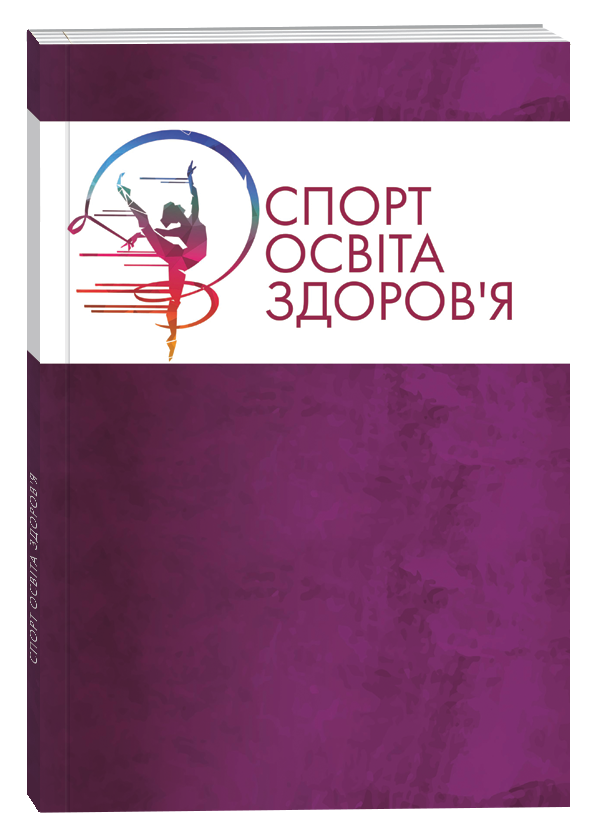PEDAGOGICAL CONDITIONS FOR TEACHING CHESS TO CHILDREN AGED 4–6 IN EXTRACURRICULAR ACTIVITIES
DOI:
https://doi.org/10.32782/sports-education/2025-1-6Keywords:
intellectual spor ts, teaching, game, preschool children, pedagogical conditions, program, algorithm, chessAbstract
Introduction. The modern educational process emphasizes the active involvement of preschool-aged children in developmental activities that foster their intellectual, emotional, and social growth. One of the effective tools for achieving this is intellectual games, particularly chess. A key challenge lies in adapting chess teaching methodologies to the developmental characteristics of children aged 4–6. Objective. To identify and substantiate the pedagogical conditions for teaching chess to children aged 4–6 during extracurricular activities, considering their age-specific features, needs, and abilities; to analyze the effectiveness of integrating gaming activities and pedagogical methods into the learning process. Methods. Literature analysis, pedagogical observation, child testing, expert assessments, and statistical analysis were employed. The study was conducted among preschool institutions in Bila Tserkva, Ukraine. Results. A teaching program for chess aimed at children aged 4–6 was developed using individual, comprehensive, and systematic approaches. This program accounts for the age characteristics of children and ensures the development of cognitive, motor, and social skills. The results demonstrated improvements in concentration, logical thinking, and strategic planning in the experimental group compared to the control group. The pedagogical conditions were found to adapt effectively to the age, preparation level, and characteristics of the learners, ensuring maximum learning efficiency. Additionally, an algorithm for constructing a chess teaching program tailored to the specific features of preschool-aged children, extracurricular activities, and intellectual sports was proposed. Conclusions. Utilizing chess as a learning tool proves effective for developing key skills in preschool-aged children. The proposed program is balanced, built upon pedagogical conditions, and tailored to the developmental characteristics of young learners, ensuring its successful impl ementation in extracurricular activities.
References
1. Александрович М.О. Методика діагностики інтелекту та інтелектуальних операцій старших дошкільнят: единбурзький рисунковий тест. Теоретична та експериментальна психологія. 2010. № 3 (1). С. 73–77.
2. Антонюк В.З. Формування інтелектуальної готовності старшого дошкільника до навчання у школі. Балтійський гуманітарний журнал. 2013. № 3. С. 5–7.
3. Балтажи К. Як навчитися грати в шашки. Абетка шашкової гри. Тернопіль : Вид-во «Підручники та посібники», 2016. 160 с.
4. Виготський Л.С. Мислення і мова. Київ : Радянська школа, 1982. 287 с.
5. Виготський Л.С. Проблема віку : збірник творів в 6 т. Т. 4.: Дитяча психологія. Ніжин, 1984. С. 244–268.
6. Виготський Л.С. Історія розвитку вищих психічних функцій. Психологія розвитку людини : монографія. М.: Вид-во Ексмо, 2005. С. 208–547.
7. Глібов А.О., Гончар О.В. Підготовка юних шашкарів : навчально-методичний посібник. Київ : Вид-во А. Глібова, 2007. 93 с.
8. Цікаві шашки: навчально-методичний посібник / Г.П. Дульська, О.В. Романюк, В.В. Семизорова, Н.В. Чижевська. Тернопіль, 2018. 80 с.
9. Педагогічні аспекти дошкільної освіти / за ред. І.І. Новикова. Київ : Освіта, 1999. 258 с.
10. Сухомлинський В.О. Серце віддаю дітям. Київ : Радянська школа, 1977. 312 с.
11. Чижевська Н. Особливості змісту занять інтелектуальними видами спорту дітей дошкільного віку на матеріалі шашок. Теорія і методика фізичного виховання і спорту. 2022. № 1. С. 25–29. DOI: https://doi.org/10.32652/tmfvs.2022.1.25-29.
12. Чижевська Н., Шинкарук О. Обґрунтування доцільності занять шашками дітей дошкільного віку. Інноваційні та інформаційні технології у фізичній культурі, спорті, фізичній терапії та ерготерапії. 2022. С. 44–45.
13. Чижевська Н., Шинкарук О. Формування здібностей в процесі занять інтелектуальними видами спорту. Інноваційні та інформаційні технології у фізичній культурі. 2021. С. 58–60.
14. Bilalić M., McLeod P., Gobet F. Does chess need intelligence? – A study with young chess players. Intelligence. 2007. Vol. 35. Р. 457–470.
15. Bronson M.B. Self-regulation in Early Childhood: Nature and Nurture. Guilford Press. 2000.
16. Chyzhevska N., Shynkaruk O. Justification of Building a Program for Teaching Checkers to Preschool Children. Youth and Olympic Movement. 2023. С. 99–100.
17. Diamond A. Activities and Programs That Improve Children’s Executive Functions. Current Directions in Psychological Science. 2012. Vol. 21 (5). Р. 335–341.
18. Diamond A., Lee K. Interventions shown to aid executive function development in children 4 to 12 years old. Science. 2011. Vol. 333(6045). Р. 959–964.
19. Diamond A., Ling D.S. Conclusions about interventions, programs, and approaches for improving executive functions that appear justified and those that, despite much hype, do not. Developmental Cognitive Neuroscience. 2016. Vol. 18. Р. 34–48.
20. Dombrovska M., Margaryan L. Cognitive Development of Preschool Children Through Playing Checkers. Psychological and Pedagogical Problems of Mental Development. 2019. Vol. 28. Р. 45–53.
21. Gardner H. Frames of Mind: The Theory of Multiple Intelligences. New York : Basic Books, 2011.
22. Gobet F., Campitelli G. Educational benefits of chess instruction: A critical review. Psicologia della Educazione e della Formazione. 2006. Vol. 8. Р. 27–42.
23. Gobet F., De Voogt A.J., Retschitzki J. Moves in mind. The Psychology of Board Games. 2004. Р. 155–186.
24. Gobet F., Simon H.A. Templates in chess memory: A mechanism for recalling several boards. Cognitive Psychology. 1996. Vol. 31 (1). Р. 1–40.
25. Kováčiková L., Takáč P. Development of cognitive skills in preschool children through playing draughts. Acta Educationis Generalis. 2017. Vol. 7 (2). Р. 7–15.
26. Piaget J. The origins of intelligence in children. International Universities Press. 2013. 440 р.
27. Piaget J. The Moral Judgment of the Child. New York : Free Press, 1997.
28. Piaget J., Inhelder B. The psychology of the child. Routledge. 1969. 192 р.
29. Ruđanović M., Babić N. Effects of Playing Checkers on Cognitive Abilities of Preschool Children. Early Child Development and Care. 2019. Vol. 189 (12). Р. 1894–1904. DOI: 10.1080/03004430.2017.1410580.

